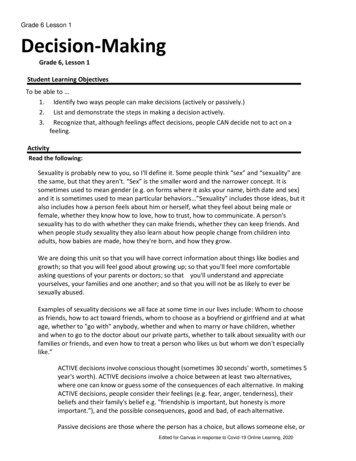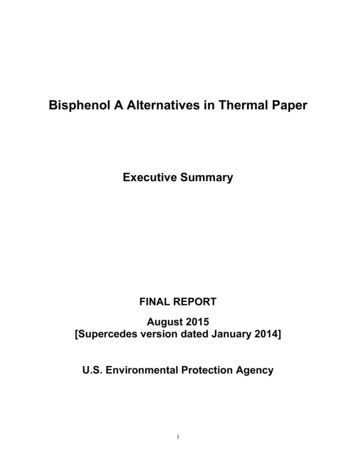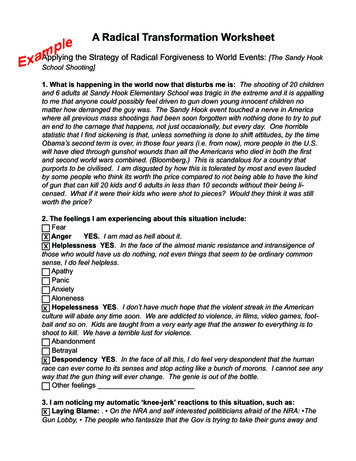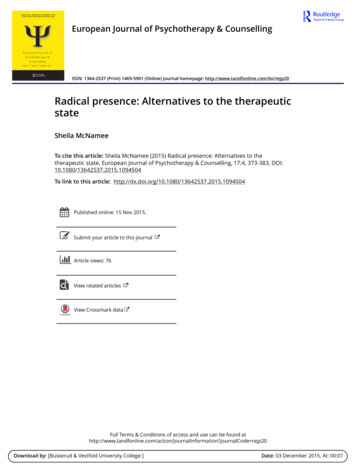
Transcription
European Journal of Psychotherapy & CounsellingISSN: 1364-2537 (Print) 1469-5901 (Online) Journal homepage: http://www.tandfonline.com/loi/rejp20Radical presence: Alternatives to the therapeuticstateSheila McNameeTo cite this article: Sheila McNamee (2015) Radical presence: Alternatives to thetherapeutic state, European Journal of Psychotherapy & Counselling, 17:4, 373-383, DOI:10.1080/13642537.2015.1094504To link to this article: lished online: 15 Nov 2015.Submit your article to this journalArticle views: 76View related articlesView Crossmark dataFull Terms & Conditions of access and use can be found tion?journalCode rejp20Download by: [Buskerud & Vestfold University College ]Date: 03 December 2015, At: 00:07
European Journal of Psychotherapy & Counselling, 2015Vol. 17, No. 4, 373–383, ical presence: Alternatives to the therapeutic stateDownloaded by [Buskerud & Vestfold University College ] at 00:07 03 December 2015Sheila McNamee*Department of Communication, University of New Hampshire, Durham, USA(Received 8 August 2015; accepted 12 August 2015)This article introduces the idea of radical presence as an alternative to thecurrent therapeutic state (or psy-complex) within which we live today.Radical presence challenges us to confront the dominance of psychologicaldiscourses which define, control, and limit the ways in which we live. Itshifts our attention from diagnosis and treatment of individuals to anexploration of broader relational and institutional contexts, and the ways inwhich professionals and ordinary people alike can be responsive, present,and open to a multiplicity of life forms.Keywords: radical presence; relational being; psy-complex; psychologicaldiscourse; therapeutic state; FoucaultDer Artikel stellt das Konzept der radikalen Präsenz als Alternative zurgegenwärtigen Therapiegesellschaft (bzw. “Psy-Komplex“) vor. RadikalePräsenz hinterfragt die Dominanz des psychologischen Diskurses, welcherunser Leben bestimmt, beherrscht und begrenzt. Es ist der Versuch, unserAugenmerk weg von Diagnosen und Behandlungsformen, hin zu einerbreiteren, relationalen und institutionellen Perspektive hin zu verschieben,und der damit verbundenen Möglichkeiten, damit Experten und ‘normale‘Personen gleichermaßen responsiv, präsent und offen für eine Vielzahl vonLebensformen sein können.Schlüsselwörter: Radikale Präsenz; relationale Existenz; Psy-Komplex;psychologischer Diskurs; TherapiegesellschaftEste artículo presenta la idea de la presencia radical como una alternativapara el presente estado terapéutico (o complejo ‘’psi’’) dentro del cualvivimos actualmente. La presencia radical nos desafía a confrontar ladominancia de los discursos psicológicos que definen el control y limitanla manera en que vivimos; desvía la atención del diagnóstico y tratamientode los individuos hacia una exploración de contextos más amplios,relacionales e institucionales y las maneras en los cuales los profesionalesy la gente común pueden ser receptivos y estar presentes y abiertos a unamultiplicidad de formas de vida.Palabras clave: presencia radical; ser relacional; complejo ‘’psi’’; discursopsicológico; estado terapéutico*Email: sheila.mcnamee@unh.edu 2015 Taylor & Francis
374S. McNameeDownloaded by [Buskerud & Vestfold University College ] at 00:07 03 December 2015Questo articolo introduce l’idea della presenza radicale come alternativaallo stato terapeutico (o psico-complesso) entro cui viviamo oggi. Presenzaradicale sfida a confrontarsi con i discorsi psicologici dominanti chedefiniscono, controllano e limitano il modo in cui viviamo. L’attenzione èspostata dalla diagnosi e dal trattamento degli individui ad una più ampiaesplorazione di contesti relazionali e istituzionali e al modo in cuiprofessionisti e persone comuni possono essere responsivi, partecipi eaperti a una molteplicità di forme di vitaParole chiave: presenza radicale; essere relazionale; psico-complesso;discorso psicologico; Stato terapeuticoCet article introduit l’idée d’une présence radicale comme alternative àl’état thérapeutique actuel (ou complexe-psy) au sein duquel nous vivonsaujourd’hui. La présence radicale nous met au défi de d’affronter ladomination des discours psychologique qui définit, contrôle et limite nosvies. Elle déplace notre attention du modèle diagnostic/traitement desindividus vers une exploration des contextes relationnels au sens large etvers les façons dont les professionnels comme les gens ordinaires peuventêtre réceptifs, présents et ouverts à la diversité des formes de vie.Mots-clés: présence radicale; être relationnel; complexe-psy; discours psychologique; Etat thérapeutiqueΑυτό το άρθρο εισαγάγει την ιδέα της ριζικής παρουσίας ως εναλλακτικήςστην τρέχουσα θεραπευτική στάση (το λεγόμενο psy-complex), η οποίαεπικρατεί σήμερα. Η ριζική παρουσία απαιτεί από εμάς να αντιμετωπίσουμετην κυριαρχία των ψυχολογικών συστημάτων λόγου που καθορίζουν,ελέγχουν και περιορίζουν τους τρόπους με τους οποίους ζούμε. Μαςπροσκαλεί να μετατοπίσουμε την προσοχή μας από τη διάγνωση και τηθεραπεία ατόμων στη διερεύνηση των ευρύτερων σχεσιακών και θεσμικώνπλαισίων και στους τρόπους με τους οποίους οι επαγγελματίες όπως και οιαπλοί άνθρωποι μπορούν να είναι δεκτικοί, παρόντες, και ανοικτοί σε μιαπολλαπλότητα των μορφών της ζωής.Λέξεις κλειδιά: Ριζική παρουσία; σχεσιακό ον; psy-complex; ψυχολογικόςλόγος; θεραπευτικό κατεστημένοIntroductionA useful way to think about the therapeutic state is to reference Nikolas Rose’sGoverning the soul: The shaping of the private self (1990) and Inventingourselves: Psychology, power and personhood (1998). In these now classicvolumes, Rose draws upon Foucault’s work (1965, 1972, 1973, 1977).Foucault and other post-structuralists argue that our sense of self, very muchsituated within the twentieth-century ideology of individuality, autonomy, freechoice, and liberty, has been constructed by the rise in stature of the social and‘psy’ disciplines. These disciplines (psychology, psychiatry, psychotherapy,psychoanalysis, sociology, and anthropology) have emerged as dominantdiscourses regulating our lives. Specifically, what a culture or society comes to
Downloaded by [Buskerud & Vestfold University College ] at 00:07 03 December 2015European Journal of Psychotherapy & Counselling375believe is ‘normal’ is regulated by the psy-disciplines including normalsexuality, family life, and what we take to be rational.To this extent then, we can say that we have been living in a ‘therapeuticstate’ (Szasz, 1984) for the last century. It is a therapeutic state because, nomatter what professional domain we encounter, we offer ourselves to thesurveillance of experts – expert doctors, expert scholars, expert therapists,expert politicians, expert managers, etc. The move to reach beyond thetherapeutic state is not a signal to obliterate psychotherapy or any of the psydisciplines, nor is it to abolish any form of expertise. It is, rather, to envisionalternatives to popularized, dominant, individualizing, and frequently pathologizing forms of life. It is to explore and imagine alternatives to individualizedpathology. For some people, this may seem an odd endeavor, while for othersit may even seem heretical. After all, there are people who have been diagnosed with psychoses, character ‘deficiencies,’ cognitive limitations, andbehavioral digressions. The common belief is that these individual problemsshould be individually treated. But what if psychosis, character, cognitive, andbehavioral oddities were not viewed as originating within an individual butwere seen, instead, as expressions of diverse values and understandings – allemerging within different languaging communities? This article will explorethis shift in focus as a move beyond the therapeutic state.Pathologizing discoursesFoucault makes clear that the disciplinary discourse referred to as the ‘psycomplex’ (Rose, 1990) is – just that – a discourse. It is a way of talking, away of being in the world. And, to put it that way, suggests that there are orcould be other ways of talking and being in the world available to us. This isnot to suggest that psy-discourses are wrong or not useful. Rather, it is to suggest that, when engaged in the therapeutic encounter, we should ask ourselveshow useful the concomitant vocabulary of psy-disciplines is – by this I meanthe vocabulary of ‘diagnosis,’ ‘pathology,’ and ‘mental disease.’ This is mostcommonly located as an individualist discourse – one that places the nexus ofa person’s being within the private recesses of the mind/psyche (McNamee,2002).The concentrated focus on the individual in contemporary society is thebyproduct of these emergent and eventually dominating discourses. And, whenunderstood in historical, cultural, and social contexts, it becomes possible torecognize that all of us are active participants in the power and dominance ofthe psy-complex. As just one small illustration, most people unthinkingly seekprofessional therapeutic help when they encounter relational challenges orproblems in their lives. In fact, what comes to be identified as a ‘problem’ or a‘challenge’ is already inscribed by the naturalization of the psy-complex. Ifone is not perpetually happy and satisfied, there must be something wrong. Ifone member of a romantic couple seeks camaraderie outside the relationship,the union of the couple is in threat. If one is dissatisfied with one’s work, theremust be some problem with one’s motivation. Basically, all problems we
Downloaded by [Buskerud & Vestfold University College ] at 00:07 03 December 2015376S. McNameeconfront in contemporary society are traced to some personal failing or flawwithin a modernist, individualist view. Furthermore, when an individual is‘working on’ his or her problems with a professional, the common assumptionis that the wisest action for those within the close network of relations is tostay away and let the professional do the work.In just these simple illustrations, we see the deterioration of relationalbonds. Where is the community to support one who is suffering? Who – ifanyone – might be able to offer alternative descriptions of what one is experiencing, descriptions that are not pathologizing? Are work problems really dueto an individual’s lack of motivation, or might ‘lack of motivation’ be arational response to an overbearing boss or competitive colleagues? A movement beyond the therapeutic state requires what I have come to call a ‘radicalpresence’ (McNamee, in press-a), that is, a multiplicity of resources for action.This fits, I think, with the necessary attentiveness to our embodied, daily interactions. An ethic of discursive potential provides us ‘with the reflexive capacity to question common practices and to contest their ‘truth status’. Arelational ethic also embraces difference and complexity, eschewing the searchfor standardized practices’ (McNamee, in press-b). Embracing a relational ethicrequires that we abandon reliance on abstract principles and formal codes –not in an attempt to create chaos or anarchy, but in an attempt to pay attentionto what is unfolding in the specific contexts and relations in which we findourselves. Also, it is important to consider these local contexts in relation tothe broader set of abstract ethical codes that have emerged into dominant discourses. This is not an ethic of ‘anything goes’. Rather, it is an ethic of responsivity to self, others, and environment and, as such, demands that any local setof practices, beliefs, or values be considered in light of more dominant socialpractices. We might say that a move away from the psy-complex and its various discourses to a focus on interactive processes (communication) is a generative move beyond the therapeutic state. This opens space for how engagedparticipants can move beyond canonical understandings and forms of practiceto co-construct generative and responsive alternatives.To be clear, often the discourse of psychology and diagnosis can be veryuseful. And sometimes it can be dangerously damaging. If we simply use thetools of the trade (i.e. diagnosis) because ‘that’s what is supposed to happen’in psychotherapy, we are not radically present. We are not reflecting on howwe collaborate in constructing the therapeutic process.Constructing a worldElsewhere (McNamee, 2014), I have offered a visualization of the dialogicfocus on interactive processes and how the responsiveness of persons to oneanother and to their environment comes to create what we ‘know,’ what we‘understand,’ and what we believe to be ‘real.’ Let us consider how specificways of understanding the world emerge. Meaning emerges as communities ofpeople coordinate their activities with one another. These meanings, in turn,create a sense of moral order. The continual coordination required in any
Downloaded by [Buskerud & Vestfold University College ] at 00:07 03 December 2015European Journal of Psychotherapy & Counselling377relationship or community eventually generates a sense of taken-for-granted,common practices otherwise known as dominant (and largely unquestioned)discourses.As people coordinate their activities with others, patterns or rituals quicklyemerge. These rituals generate a sense of standards and expectations that weuse to assess our own and others’ actions. Once these standardizing modes arein place, the generation of values and beliefs (a moral order) is initiated. Thus,from the very simple process of coordinating our activities with each other, wedevelop entire belief systems, moralities, and values. Of course, the startingpoint for analysis of any given moral order (reality) is not restricted to ourrelational coordinations. We can equally explore patterns of interaction or thesense of obligation (standards and expectations) that participants report in anygiven moment. We can also start with the emergent moral orders, themselves(dominant discourses as many would call them), and engage in a Foucauldianarcheology of knowledge (1969) where we examine how certain beliefs, values, and practices originally emerged (which returns us to the simple coordinations of people and environments in specific historical, cultural, and localmoments). The relational process of creating a worldview can be illustrated inFigure 1 as follows.This is a simplified way of illustrating the relation among coordinatedactions, emergent patterns, a sense of expectations, and the creation of dominant discourses. Adopting a radical presence focuses our attention on the specificities of any given interaction while also allowing us to note patterns acrossinteractions, across time, place, and culture.From mining the mental to radical presence: illustrationsThus far, my discussion of radical presence has been vague. My hope is thatthe notion is not conceptually vague or philosophically vague but I can imagine it, at this point, to be pragmatically vague. Yet, there is no technique,method, or specific strategy that accompanies radical presence. Instead, there isa way of positioning oneself in the world. Stewart and Zediker (2000), in theirdescription of dialog (a form of interaction that I would claim requires andembodies radical presence), describe ‘letting the other happen to you whileholding your own ground’ (p. 232). If you think about this, you recognize adramatic shift from our ordinary, individualist way of operating in the world.Typically, we are taught to ‘hold our own ground.’ The persuasive rhetoric ofeveryday life requires us to hold our ground. Often the shift to a relational orientation such as the one I am presenting here is understood by critics as aposition in favor of rampant relativism. If such were the case, holding one’sground would certainly not be championed with a relational stance. Yet, as wecan see, the difference that makes a difference (as Gregory Bateson wouldsay), is that one hold’s one’s own ground while being open to the other’s orientation. Such a stance promotes neither debate-like forms of interaction norinteractions requiring complete surrender. My position (ground) is changed byvirtue of considering yours. It is no longer me and my view against you and
Downloaded by [Buskerud & Vestfold University College ] at 00:07 03 December 2015378S. McNameeFigure 1. Constructing a World.your view. It is my view in relation to your view. Dialog, as a form of radicalpresence, encourages curiosity for difference, openness to forming new understandings, and a movement away from agreement or adjudication of perspectives. Yet, the question remains: how can we put this into action? Whatfollows are several illustrations of radical presence in action.Family care foundation1Carina Håkansson is the founder and leader of the Family Care Foundation inSweden. She has written about the work of this foundation in her book,Ordinary life therapy (Håkansson, 2009). The foundation creates networks thatcan, in very ordinary ways, help seriously troubled individuals. Observing thatthe typical ways of treating people in distress (often people identified aspsychotic) were not successful, Håkansson and her colleagues dared to imagineplacing those who are troubled in ordinary family homes. She noted that hospitals, prisons, and institutions did little (or nothing) to assist a person inreclaiming his or her life. Yet, in building a community of support and respectby placing ‘patients’ in the homes of ordinary families, Håkansson and hercolleagues have demonstrated the power of radical presence.Håkansson (2009) does not claim that those who have been diagnosed aspsychotic are ‘normal.’ What she claims is that everyone is ‘normal’ and‘abnormal’ in different ways, in different contexts, and at different times. Forexample, a young man, confused about his future and feeling lost has a badreaction to an argument with a friend, family member, or lover or perhaps
Downloaded by [Buskerud & Vestfold University College ] at 00:07 03 December 2015European Journal of Psychotherapy & Counselling379he has what appears to be a psychotic episode after drinking or imbibing insome recreational drug. Any of these instances, if frozen in time, can warrantthe label of psychosis and, if this is the case, the young man is most likelyescorted to the local psychiatric institution. Once there, interviews (alreadycouched within the medical frame of psychosis) seem to only prove the diagnosis. The more the young man resists, the more he becomes agitated, themore he perhaps becomes violent, the more ‘accurate’ the diagnosis. The consequential admission to the psychiatric hospital, complete with numbing dosesof heavy medications follows. Each time the young man becomes once againagitated or ‘difficult,’ more medications are dispensed and more evidence isproduced to insure that the diagnosis is correct.How does one escape this cycle? It might not be exactly as described inthe above scenario. The young man (or woman) might be taken to prisoninstead of a psychiatric hospital. In prison, the condemnation, the isolation, thefear, and humiliation provide ample support for the persistence of whatbecomes identified as criminal or psychotic behavior.Breaking this pattern demands radical presence. It demands that instead ofquick explanations provided by dominating understandings of what it means tobe psychotic or criminal are (at least temporarily) put on pause. It means thatwhat appears to be the obvious contextualization of the situation is questionedand that the context is broadened, the story expanded beyond the moment ofdigression, and alternative understandings are invited into the conversation.When the Family Care Foundation places a person in a family home, thatperson is treated with respect. That person is treated as an ‘ordinary’ memberof the household. This means that the newcomer is expected to pitch in, do thechores as other household members do. There is no attempt to figure out whatis wrong with the ‘stranger’ but there is an attempt to integrate him or her intothe flow of the family’s life.Here we see a beautiful illustration of radical presence. Both professionalsand host families operate from the assumption that responsivity, respect, sensitivity to differences in dealings with issues of time and space can invite the‘psychotic’ individual into an ordinary identity. It is an illustration of holdingone’s own ground while letting the other happen to you.Isolation and addictionJohann Hari (2015) has written a compelling book about drug addiction. Hetravelled the world investigating this social problem. His work was heavilyinfluenced by research conducted by psychologist Bruce Alexander in the1970’s (Alexander, 2008). Alexander (2008, in Hari, 2015) noted that bothaddiction to and withdrawal from drugs was not a chemical reaction aspopularized in the media. At the time of Alexander’s experiments, there was apopular antidrug advertisement on television. The advertisement portrayed a ratin a cage with a bottle of water laced with cocaine – identified as a deadlydrug. The rat is shown returning over and over to the bottle to partake in moreof the cocaine induced water. Eventually, the rat falls over dead. Alexander
380S. McNameeDownloaded by [Buskerud & Vestfold University College ] at 00:07 03 December 2015(2008, in Hari, 2015), noted one feature of this advertisement that served toinspire his creative line of research: the rat was alone in the cage. He questioned the common wisdom about addiction based on his observations of andwork with drug addicts. He proposed that drug addiction has less to do withthe actual chemicals and the reaction of those chemicals on the brain. He proposed that addiction has more to do with environment and relations, and he noticed something rats had been put in an empty cage. They were allalone, with no toys, and no activities, and no friends. There was nothing for themto do but to take the drug. (Alexander, 2008, in Hari, 2015, p. 171)Alexander (2008, in Hari, 2015) set out to explore the influence of environment on addiction. In his study, there were two rat cages. One that containedan isolated rat with two bottles: one with water and one with morphine. In thesecond cage, the cage Alexander called the ‘Rat Park,’ he provided wheels,balls, good food, and instead of putting one rat in the cage alone, he put several rats in together. The second cage, like the first, had two bottles: one withwater and one with morphine. What Alexander observed was that the rats inthe Rat Park drank ‘less than 5 milligrams’ of the morphine while the rats inthe isolated cages ‘used up to 25 milligrams of morphine a day’ (Alexander,2008, in Hari, 2015, p. 172). Even more interesting was thatHe took a set of rats and made them drink the morphine solution for fifty-sevendays, in their cage, alone. If drugs can hijack your brain, that will definitely doit. Then he put these junkies into Rat Park. Would they carry on using compulsively, even when their environment improved? In Rat Park, the junkie ratsseemed to have some twitches of withdrawal – but quite quickly, they soppeddrinking the morphine. A happy social environment, it seemed, freed them oftheir addiction. (Alexander, 2008, in Hari, 2015, p. 172)There’s much more to be said about this and the interested reader is encouraged to read Hari’s book (2015). But the question for us is, what does thishave to do with radical presence and alternatives to the therapeutic state?Everything. In Hari’s description of Alexander’s research, we see strong support for a social, relational approach to human problems. It is an approach thatdiverges from the ‘go to’ method of individual diagnosis and treatment. Payingattention to a person’s relational environment – not just with other humans butthe physical environment as well – offers a wealth of resources for transforming problems. When we expand beyond the individualized, medicalizedapproach, we recognize that those suffering have options. Perhaps, the optionsare choices made between participating in certain relationships over others. Orperhaps alternative forms of explanation can be generated once we expand ourattention beyond the singular person. This too, is what radical presence isabout. It requires a curiosity, a responsivity, and a desire to understand beyondwhat appears to be ‘obvious.’ Alexander (2008, in Hari, 2015) illustrated justsuch radical presence in noticing – the very simple act of noticing – one smallbut significant factor: isolation vs. relational engagement.
European Journal of Psychotherapy & Counselling381Downloaded by [Buskerud & Vestfold University College ] at 00:07 03 December 2015Community outreachAs another illustration of radical presence in action, Holzman (2015a) reportssome very interesting results of a community survey focused on lay opinionsof diagnosis and medication. She reports that for the past few years she andher colleagues have spent time on the streets of New York City surveying ordinary people about biologically based diagnosis. They wanted to know whatwould be ‘effective ways to involve people in learning about alternatives and,for those who wanted more choices, in shaping new approaches in collaboration with like-minded professionals’ (Holzman, 2015b). The results of thesurvey indicate thatEveryone offered an alternative [to diagnosis and medication], with most peoplesuggesting more than one. The most frequent responses involved talking to people – therapy, counseling, group therapy being the most common (including, ‘Acenter they can go to without getting diagnosed’), followed by family, friends,self-help and support groups.A wide variety of social activities and life style changes were recommended –volunteering, hobbies, music, dance, writing, meditation, exercise, yoga, diet,prayer and creating community (Holzman, 2015b)What the respondents in Holzman’s report are suggesting is that, when facedwith problems, interaction with others is often more useful than diagnosis. Infact, as Hari (2015) illustrates in the case of addiction, problems that are currently described as ‘chemical,’ ‘biological,’ or ‘neurological’ are often thebyproduct of social relations. This raises an important question: Are weobliged to inquire into an alternative understanding of personal suffering?What would happen if our attention was diverted from searching for the properdiagnosis, evaluation, assessment or answer, and instead focused on examiningbroader social conditions and how ‘problems’ might actually be logicalresponses to these conditions? This is the focus that will direct us beyond thetherapeutic state. Like Håkansson (2009), Hari (2015), and Alexander (2008),the community outreach spearheaded by Holzman (2015a, 2015b) and hercolleagues is rooted in radical presence.Radical presence as a different path for going on togetherTo me, it is clear that radical presence positions us to appreciate a relationalunderstanding of the social world. With so many traditions, beliefs, and valuesto coordinate, how could unanimity be possible, how could some abstractedform of understanding/knowledge be possible? The world is complex, notsimple. It is time that we embrace this complexity and develop ways ofcoordinating complexity rather than eliminating it by providing ‘expert diagnoses’ to decontextualized or partially contextualized actions. That is whatbrings us to a radical presence in the daily, mundane interchanges of life. Afterall, wouldn’t it be more generative to replace the impulse to resort to the nor-
Downloaded by [Buskerud & Vestfold University College ] at 00:07 03 December 2015382S. McNameemalized practices constructed by dominant discourses with the impulse to becurious about differences? Let’s not define coordination of difference as agreement; let’s define it as understanding (where understanding does not meanagreement, evaluation, or judgment – it simply means generating curiosityabout difference). Our respectful attempts to understand might foster newforms of coordinated activity and this coordination might be focused ontolerance of difference – a radical presence.If we focus our attention on how the perpetuation of undesirable situationsis not the sole problem of a specific individual but is the byproduct of particular forms of life – that is, ways of living in community – we might begin tosee both how to transform those patterns into novel ways of going on togetherin the world and how to appreciate difference as a natural part of social life –not necessarily something that must be repressed, avoided, or minimized. Weneed to widen the lens; we need to see and assess what is happening withinour communities, our institutions, and our culture. Important questions to askinclude: How does therapy for my problems assist me in generating strongrelational bonds? How do diagnosis, evaluation, and assessment help meappreciate the relations that show support and care? Can we harness the potential of coordinating differences to move beyond simple solutions and universalresolutions? What if we began to view difference as a resource for creativity,novelty, and social transformation?As long as we shelter ourselves within the discourse of psychology, weavoid confronting some of the most vexing challenges of today. When problemsare individual problems, we can treat, punish, or educate individuals to ‘fit in’to the preferred view of social life. If instead we ask ourselves how our broadersocial structures and our ways of maintaining those social structures contributeto alienation, disengagement, humiliation, degradation, and negative evaluation,we recognize our own participation in the perpetuation of individualized pathology. By adopting a radical presence, we can move beyond the therapeutic stateand harness the vast resources available when multiple communities coordinatetogether to create ways of ‘going on together’ (Wittgenstein, 1953).Note1.T
Radical presence: Alternatives to the therapeutic state Sheila McNamee* Department of Communication, University of New Hampshire, Durham, USA (Received 8 August 2015; accepted 12 August 2015) This article introduces the idea of radical presence as an alternative to the current therapeutic state (or psy-complex) within which we live today.



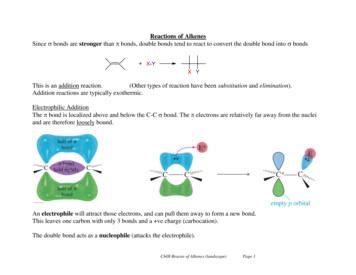
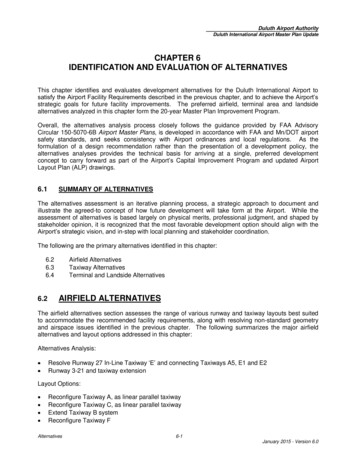
![Radical Healing Syllabus[4] - School of Social Work](/img/36/radical-healing-syllabus-2.jpg)


